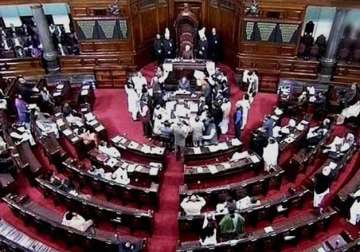Parliament clears Juvenile Justice Bill: All you need to know about the new law
New Delhi: The Rajya Sabha yesterday cleared the Juvenile Justice Bill amid mounting public pressure following the release of the juvenile convict in the Nirbhaya gangrape case. The passage of the Bill, which replaces the

New Delhi: The Rajya Sabha yesterday cleared the Juvenile Justice Bill amid mounting public pressure following the release of the juvenile convict in the Nirbhaya gangrape case.
The passage of the Bill, which replaces the Juvenile Justice (Care and Protection of Children) Act, 2000, now paves way for the trial of those between 16-18 years as ‘adults' in case of heinous offences. Also, anyone between 16-18 years who commits a less serious offence can be tried as an adult if he is apprehended after he attains the age of 21.
The new law also provides for the setting up of a Juvenile Justice Boards (JJB) and a Child Welfare Committees (CWC) will in each district. The JJB will also conduct a preliminary inquiry to determine whether a juvenile offender is to be sent for rehabilitation or be tried as an adult. Penalties for cruelty against a child, offering a narcotic substance to a child, and abduction or selling a child, have also been prescribed.
The law, however, will not apply retrospectively and will have no impact on the Nirbhaya convict who was release Sunday. Nirbhaya's parents, who were present in the House throughout the proceedings in the legislation, expressed satisfaction over the passage of the Bill and hoped that it would help future cases. “Somewhere, we do feel that Nirbhaya did not get due justice,” a teary-eyed Nirbhaya's mother Asha Devi told reporters outside Parliament.
The law passed in Rajya Sabha, was listed for passage in the current Winter Session of the Parliament. The bill was passed by the Lok Sabha after consolidating certain amendments in May 2015. The CPM staged a walk out from the Rajya Sabha over the issue of the Bill not being referred to a Select Committee.
The decision comes against the backdrop of the Supreme Court's refusal to consider a plea against the release of the ‘juvenile' convict in the horrific December 16, 2012 case.
Read Also: Nirbhaya's parents witness Rajya Sabha proceedings on juvenile bill
Here is a contrast between the Juvenile Justice Act, 2000 and the new law enacted by Parliament:
1. Treatment of juveniles: The 2000 Act clearly states that the children under the age of 18 years are to be treated equally. The 2015 bill suggests that juveniles aged between 16 to 18 years of age committing dreadful offences be treated as adults.
2. Penalty: Maximum penalty for a juvenile in the 2000 Act is three years. The current bill paves way for harsher punishments, though it keeps death penalty and life imprisonment out of its ambit.
3. Role of Juvenile Justice Board (JJB): The 2000 Act clearly states that JJB will conduct an inquiry and direct the juvenile to be placed in a fit institution for a maximum period of three years in rehabilitation.
The proposed Bill empowers the JJB to conduct a preliminary inquiry in certain cases to establish whether a child is placed in a home or sent to Children's Court.
4. Child Welfare Committee: The 2000 Act leaves out the frequency of meetings for the child welfare committee (CWC), but the current bill mandates that the committee meet at least 20 days in a month.
5. Appeals: Under the 2000 Act, appeals could be made within 30 days of JJB order in a Sessions court and further appeal to a High Court. According to the current Bill, appeals will have to be within 30 days to the Children's Court and then the High Court.
6. Adoption: There is no provision for inter-country adoption in the 2000 Act. However, Guidelines Governing the Adoption of Children, 2011, provide for inter-country adoption of children. Under the current bill, inter-country adoption of children can take place within the country if child has been declared legally free for adoption.
7. Foster care of juvenile: The 2000 Act allows a child to be given for temporary placement with a family for a short period of time, where the biological family of the child may be allowed to visit. On the other hand, the current Bill adds a new provision for monthly checks on foster family by the CWC.
8. After care: The 2000 Act provides for monetary and continued support for children after they leave special or children home for a period of three years or until 21 years of age. The current Bill allows the child to be provided one-time financial support by a child care institution after completing 18 years of age.